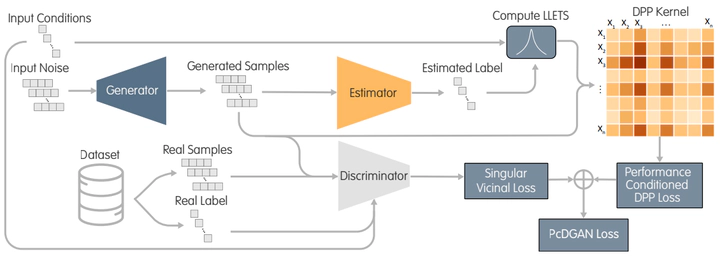PcDGAN: A Continuous Conditional Diverse Generative Adversarial Network For Inverse Design

Abstract
Engineering design tasks often require synthesizing new designs that meet desired performance requirements. The conventional design process, which requires iterative optimization and performance evaluation, is slow and dependent on initial designs. Past work has used conditional generative adversarial networks (cGANs) to enable direct design synthesis for given target performances. However, most existing cGANs are restricted to categorical conditions. Recent work on Continuous conditional GAN (CcGAN) tries to address this problem, but still faces two challenges: 1) it performs poorly on non-uniform performance distributions, and 2) the generated designs may not cover the entire design space. We propose a new model, named Performance Conditioned Diverse Generative Adversarial Network (PcDGAN), which introduces a singular vicinal loss combined with a Determinantal Point Processes (DPP) based loss function to enhance diversity. PcDGAN uses a new self-reinforcing score called the Lambert Log Exponential Transition Score (LLETS) for improved conditioning. Experiments on synthetic problems and a real-world airfoil design problem demonstrate that PcDGAN outperforms state-of-the-art GAN models and improves the conditioning likelihood by 69% in an airfoil generation task and up to 78% in synthetic conditional generation tasks and achieves greater design space coverage. The proposed method enables efficient design synthesis and design space exploration with applications ranging from CAD model generation to metamaterial selection.